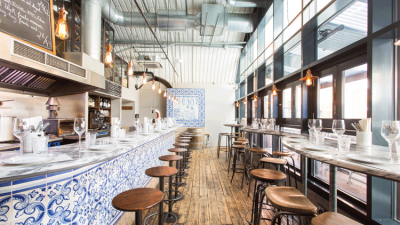What do you think 2019 will bring for the restaurant industry?

Paul Ainsworth, chef-patron, Paul Ainsworth at No6
I don’t think there is going to be one big trend like there has been in the past. It has almost become trendy not to be trendy. Restaurants will become even more focused on British produce (factoring in Brexit) and seasonality, continuing to cook with incredible ingredients. There are so many diverse cuisines already in the UK, but one I think that will become even more popular is Mexican cuisine. One style of cuisine that is already in full effect is Japanese food, but I reckon it will become even bigger as consumers are becoming more conscious with what they eat. Japanese food ticks the boxes for clean eating.
Saiphin Moore, founder, Rosa’s Thai Café and Lao Café
Readily available and eaten in Laos and Thailand, edible bugs have already been tipped as the protein of the future. However, the use of insects is not something that will just explode on to the UK restaurant scene. You have to understand the flavours and textures of the bugs to really do them justice and we have spent a lot of time employing our experience in cooking with and eating insects in Thailand and Laos to introduce them to the menu at Lao Cafe. I see bugs slowly being introduced to restaurants as one-off dishes initially as the concept is still quite alien to a lot of people. But more people are becoming open to the idea – once they try them they realise they aren’t bad!
Lee Westcott, chef-patron, Pensons
Sadly, I think restaurant chains will suffer due to the Brexit deal, which will unfortunately result in an increase in staffing issues and potential restaurant closures. We’ll see more chefs open more casual-dining concepts inside and outside London. I’d love to see a rise in the amount of female chefs in our industry and a better work-life balance for the employees of the restaurant industry.
Bryn Williams, executive chef, Bryn Williams at Somerset House (pictured right)
We’ll see a lot more cooking over fire and people going back to the basics and experimenting with these very traditional flame-based cooking methods. The demand for plant-based food will continue to grow at an exponential rate –we’ll not only see an increase in vegan and vegetarian food, but also dishes that contain some meat or fish but champion the vegetable components instead, as we do at Somerset House.
Steve Drake, chef-patron, Sorrel
Over the past couple of years, there have been a lot of fashions and trends, but I believe that in 2019 we will be going back to basics. I think it’ll be all about flavour-focused food, where it’s from, and the techniques we’re all using. I also think we’ll see an influx in young chefs opening small independents on high streets using crowdfunding. This will hopefully enable some great talents to cook really creative and inspiring food.
Anna Hansen, chef-owner, The Modern Pantry
We can expect to see some closures throughout this period of turbulence. The market will need to adapt and make changes as restaurants work out where their food and staff are going to come from.
Stevie Parle, owner, Palatino, Craft London, Pastaio and Sardine
Something approaching an apocalypse. As well as the ongoing chain casual-dining crunch, we’ll see more regular restaurants deciding the risk/reward dynamic isn’t working for them anymore. And if Brexit progresses in any form, the impact of massively reduced EU migration will probably have a pretty massive impact on all of us.
Miles Kirby, co-founder and chef-director, Caravan Restaurants
For a time, growth in many businesses will slow considerably. With a slowing market and a lack of investment confidence comes opportunity, as rents become more realistic for a restaurant operator to consider, which will hopefully lead to the birth of fresh new concepts hitting the market.
Ben Tish, culinary director, The Stafford London (pictured right)
The focus will remain on combating waste and reducing our meat and fish consumption, with vegetarianism and veganism continuing to rise. This isn’t necessarily about healthy eating though, it is often about helping the environment.
Mark Dobbie, Andy Oliver and Tom George, co-owners, Som Saa
Demand for market hall dining will continue to increase as not only new businesses but also established operators opt for food halls over traditional bricks and mortar sites.
Edward Parkes, director and co-founder, The Gentlemen Baristas
While trends have often focused on just the product (cold brew, nitro) as we enter the fifth wave of coffee, the entire sensory experience will be the hit of next year. This coffee experience will begin as soon as a customer walks through the door and will last until they leave – every facet will be considered to enhance the coffee on offer. This doesn’t mean over-the-top attention from a barista, but a thoughtful, considered and bespoke style of service. There will be fads such as coffee soft serve ice cream and new boozy coffee cocktails, but the hit of 2019 will be a greater emphasis on the importance of customer service.
Ted Schama, joint managing partner, Shelley Sandzer
I’m calling a ‘mini me’ trend of ultra compact units. Unexpectedly, even though there is a total focus on footfall, by minimising their model, more interesting areas of regeneration hit the radar. In fact, most areas within London zones 1 and 2 become viable, so long as they sit close to the Tube or a recognised pitch. This is backed up by the quantum of sales generated by home delivery so the stand-alone turnover required is softened.
The regions are also benefiting from the softening of the market with existing and newly funded operators expanding on the smaller model. In the year ahead, more people will be spoilt for choice further afield than before.
David Gleave MW, managing director, Liberty Wines
Provenance has long been a watchword on menus, and the same is increasingly true for wine lists. Wine drinkers want to know more about their wine, whether it’s around sustainability in the vineyard or dietary considerations like vegetarianism and veganism. This push for increased traceability and better communication is set to gather momentum.
In 2019, we expect to see more wines from Portugal. After Italy, Portugal has the highest number of native grape varieties of any wine producing country. The quality of viticulture and winemaking has improved markedly, with the result that Portuguese wines now offer a wide range of interesting and individual styles to those looking for wallet-friendly and characterful wines. Look out for vibrant, zesty Vinho Verde, the intriguingly minerally Encruzado white wines from Dao and the fruity, structured Touriga Nacional-based wines from the Douro and Dao regions.



























